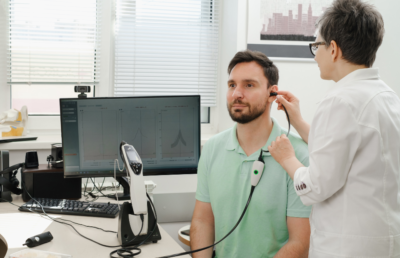Getting used to hearing aids can take a little while, especially if you’ve never worn them before. The first few days may be difficult, but consistent hearing aid use is essential to your success and satisfaction and can influence whether or not you continue to use your devices. These 10 tips and tricks will help your adjustment go as smoothly as possible so that you’ll be more likely to keep enjoying your new hearing aids for years to come.
Have realistic expectations
Bear in mind that while today’s hearing aids are amazing in their technological capabilities, they cannot completely restore normal hearing. On the other hand, they can improve the quality of life for users by amplifying soft sounds and reducing competing loud background noises. Your hearing aid can significantly improve your ability to interact with the world around you, including hearing and understanding others when they talk, engaging in group activities, watching television, and improving sound awareness for safety. Hearing aids will create an ease of listening instead of having to work so hard.
Follow the audiologist recommendations
You did not lose your hearing overnight. It takes time for your hearing system to wake up and start hearing again. Consistent use will help that process occur more quickly. Your brain takes time to adapt and wearing them during the adaptation phase is vital to your success. You may hear sounds you have not heard in awhile or things may sound different to you–that is okay. As you wear them more, your brain will learn to interpret that sound more normal.
Get used to the feeling of wearing your hearing aids
Just like wearing glasses for the first time may feel funny, your ears may also need some time to adjust to the feeling of your hearing aids. You may be able to feel the devices in your ears at first, but this feeling will go away in a few days.
Read aloud to yourself
You may find the sound of your own voice funny at first, but this will also resolve itself in a few days. Reading aloud to yourself or talking to your pet can help you get used to your own voice more quickly and practice a natural, comfortable volume of speaking.
Practice talking to people in groups
Start out by having only one-on-one conversations with your family and close friends at first, and when you feel more comfortable, you can try talking to people in a smaller group. Practice active listening, which means making sure you face the speaker and look right at them while they’re talking and avoid turning your head so they talk into your ear.
Don’t play with the volume too much
Most modern hearing aids will adjust to different listening situations automatically, so they shouldn’t need to be manually adjusted, but everything will be explained by your audiologist when you get your new device. By adjusting them too soft or too loud, your brain is not getting the sound recommended for your hearing loss. Rather, if the sound is too loud or too soft, call your audiologist for a hearing aid adjustment.
Take notes
Follow-up care is vital to the success of hearing instrument wear. A good audiologist patient relationship will require that the patient do some homework. The audiologist will want to know where you still encountered trouble and in what situations were you hearing better in. Take notes so you can provide information for the audiologist.
Attend follow-up visits
Be sure to attend follow-up visits with your audiologist to fine-tune the sounds you’re hearing, adjust the fit in your ear, and discuss challenging situations. You can tell your audiologist everything about this new experience, and about sounds you may still find bothersome, which they may be able to help you tune out. Most hearing aids are not set to target at the initial fitting and adjustments and fine tuning will ensure you are detecting sounds at a normal level.
Expect some frustration, especially with background noise
If you’ve had problems with your hearing for a few years, you may experience a bit of sound overload. For instance, noises like the humming of the refrigerator or a clock ticking might seem very loud. This is because your brain has forgotten how to sort out background noise and to prioritize certain sounds over others. If you’re adjusting to a new hearing aid, you have to relearn how to ignore background noise, so be patient and let your brain adjust slowly. Utilizing communication strategies, in conjunction with the hearing aids, will help in the success of this.
Phone pairing might need extra support
Remember that smartphones have issues too. Many times updates to smart phones are released before hearing aid manufacturers are able to see the effects they have on the hearing aids. If you have a phone issue, it is best and quickest to contact the hearing aid manufacturer consumer support line. Ask your audiologist for that information.
If you’d like to learn more about hearing devices, you can find more resources here. If you’d like to see an audiologist for a hearing evaluation or to get your hearing aids tuned up, book an appointment now!




